(6)非谓语动词
非谓语动词非谓语形式(详细)

动词非谓语形式一.基本概念:顾名思义,不担任谓语成分而担任其他语法功能的动词称为非谓语动词,有to do (动词不定式) / -ing (现在分词 / 动名词) / -ed (过去分词)三个形式。
由于他们不受主语人称和数的限制,故也称为"非限定动词"。
(学习中不要刻意去区分现在分词和动名词)二.非谓语动词的时态和语态意义:英语中动词有两大基本特征:时态和语态的变化。
非谓语动词也是动词,当然也具备动词的这两大特征。
1. 时态概念:非谓语动词只有"过去、现在和将来"三个时间概念,他与谓语动词时态的区别是:谓语动词表示的是实际时间概念,如I am learning English.是指讲话的时候或那段时间里"我正在学英语"。
而非谓语动词的"过去、现在和将来"是指相对于谓语动词而言的"过去、现在和将来",即先于谓语动词的行为或状态称为"过去时",与谓语动词的行为或状态发生在同一时间(段)的称为"现在时",而发生在谓语动词的行为或状态之后的称为"将来时"。
这个时间概念对于后面要讲的非谓语动词的句法功能是非常重要的。
2. 语态概念:与谓语动词一样,非谓语动词也有主动语态和被动语态之分。
也就是要记住四句话:(1) 表示将来时;(2) 表示现在时;(3) 表示过去时(一定是被动的)(4) 动词不定式的完成时表示过去时非谓语动词的上述时态和语态概念是理解非谓语动词句法功能、应试判题和翻译的基础。
请你判断一下,下面句子中的非谓语动词是什么时态和语态:Your duty is to look after the sick child. (你的责任是照料这个病孩。
将来/ 主动)The sick child needs to be looked after by a special person. (这个病孩需要专人照顾。
句法6.非谓语动词

forgetting (forget) your name.
非谓语动词- 介词后作宾语 非谓语动词-在介词后作宾语
13. be busy (in) doing…… ☞忙于做某事
I am busy (in) working (work) on a new book.
work on:
write
非谓语动词-在介词后作宾语
非谓语动词- 介词后作宾语 非谓语动词-在介词后作宾语
8. keep on doing…… ☞继续做某事,坚持做某事
We kept on dancing (dance) all night.
非谓语动词- 介词后作宾语 非谓语动词-在介词后作宾语
9. take part in doing……☞参加,参与…活动 He encouraged us to take part in protecting (protect) the rivers,lakes. encourage:
mind doing
Would you mind opening (open) the window.
非谓语动词-在动词后作宾语
go doing 去做某事
Let’s go dancing (dance)!
do some doing I usually do some
做某事 reading (read) in the weekend.
2.be good at doing sth… ☞在…方面拿手,擅长
He is good at swimming (swim).
非谓语动词-在介词后作宾语
3. be interested in…… ☞对…感兴趣
I am not really interested in fishing (fish).
常用非谓语用法大总结

非谓语用法总结一、非谓语动词的含义非谓语动词首先是一种动词形式,其次是这种动词形式不能做谓语,综合这两点,我们将其叫做非谓语动词。
二、非谓语动词的形式非谓语动词包含四种形式,即不定式、动名词、现在分词和过去分词。
其中,每种形式按照发生时间和主被动又包括不同的子形式。
具体如下:1.不定式(1)基本形式:to do 表示主动,并且一般表示将来(2)被动式:to be done 表示被动,并且一般表示将来(3)进行式:to be doing 表示主动和进行(4)完成时:to have done 表示主动和完成(5)完成被动式:to have been done 表示被动和完成(6)完成进行式:to have been doing 表示主动和完成进行2。
动名词(1)基本形式:doing 表示主动(2)被动式:being done 表示被动(3)完成式:having done 表示主动和完成(4)完成被动式:having been done 表示被动和完成3.现在分词(1)基本形式:doing 表示主动和进行(2)被动式:being done 表示被动和进行(3)完成式:having done 表示主动和完成(4)完成被动式:having been done 表示被动和完成4.过去分词(1)done,及物动词的过去分词表示被动或完成;(2)不及物动词的过去分词表示主动或完成三、专题要点非谓语动词和独立主格结构主要用法如下:1。
动名词和动词不定式作主语、宾语;2。
只跟动名词作宾语的动词或动词短语;3.只跟动词不定式作宾语的常见动词;4.既可以跟动名词又可以跟动词不定式作宾语,且意义不同的动词或短语;5。
不定式、现在分词、过去分词作宾语补足语的区别;6。
不定式、现在分词、过去分词作定语时的区别;7。
不定式、现在分词、过去分词作状语时的区别;8。
动名词的复合结构在句中作状语;9.there be 结构的两种非谓语形式;10.独立主格结构在句中作状语;11。
高考英语总复习语法贯通专题六 非谓语动词

返回
(2)使役动词 make, let, have, get 后接复合宾语的情况:
do 让……做…… ①make+宾语+do宾ne语与让宾…补…为被逻做辑上的主动关系
宾语与宾补为逻辑上的被动关系 The teacher made some students stay in the classroom after school.老师让一些学生放学后待在教室里。 He tried to make himself understood. 他尽量把自己的意思表达清楚了。
In order to pass the exam, he worked hard. 为了通过考试,他努力学习。 (3)作目的状语的动词不定式动作必须是主语发出的。
To learn English well, his father bought him a dictionary.(×)
返回
命题 点 感悟
返回
He had the computer working all the night. 他让电脑工作了一夜。 He had his wallet stolen on his way home. 在回家的路上,他的钱包被偷了。
返回
She got her bike running very fast. 她把自行车骑得飞快。 I'll get my bike repaired tomorrow. 我明天要(请人)修一下我的自行车。
返回
命题 点 感悟
返回
单句语法填空 ①(2018·浙江 11 月高考)Larger amounts of caffeine can cause a problem ________ (call) caffeinism. 解析:called problem 与 call 之间是被动关系,故用过去分词 called 作 problem 的后置定语。 ②(2017·浙江 6 月高考)But something made her look closer, and she noticed a ________ (shine) object. 解析:shining 空处作 object 的前置定语,故填 shining。
非谓语动词知识点总结

非谓语动词知识点总结非谓语动词是英语语法中的一个重要知识点,它可以用来修饰主语或宾语,增强句子的表达力和信息量。
在本文中,我将详细介绍非谓语动词的用法和一些常见的形式。
希望通过本文的阅读,读者能够更好地理解和运用非谓语动词,提高自己的英语写作水平。
一、非谓语动词的定义和分类非谓语动词是指在句子中充当动词的成分,但不具备谓语的功能。
它不受主语的人称和数的限制,也不受时态的影响。
根据其形式和功能的不同,非谓语动词可以分为动名词、不定式和分词三种形式。
1. 动名词(Gerund)动名词是动词加上-ing形式构成的名词,常用作主语、宾语、表语、宾补等。
例如:- Smoking is harmful to health.(吸烟对健康有害)- I enjoy swimming in the sea.(我喜欢在海里游泳)- His hobby is playing basketball.(他的爱好是打篮球)2. 不定式(Infinitive)不定式是动词的原形加上to构成的形式,常用作动词、形容词或名词的补语。
例如:- He wants to buy a new car.(他想买一辆新车)- I have a lot of work to do.(我有很多工作要做)- The book is too heavy to carry.(这本书太重,无法携带)3. 分词(Participle)分词是动词的-ing形式(现在分词)或-ed、-en等形式(过去分词)构成的形容词,常用作定语、状语或补语。
例如:- The running water is very clear.(流动的水非常清澈)- The broken vase has been repaired.(打破的花瓶已经修好了)- We were surprised by the exciting news.(令人兴奋的消息让我们感到惊讶)二、非谓语动词的用法非谓语动词在句子中具有独立的语法功能,可以用来修饰名词、代词、动词、形容词和副词等,以及构成复合句的各种从句。
初中英语语法专题六非谓语动词
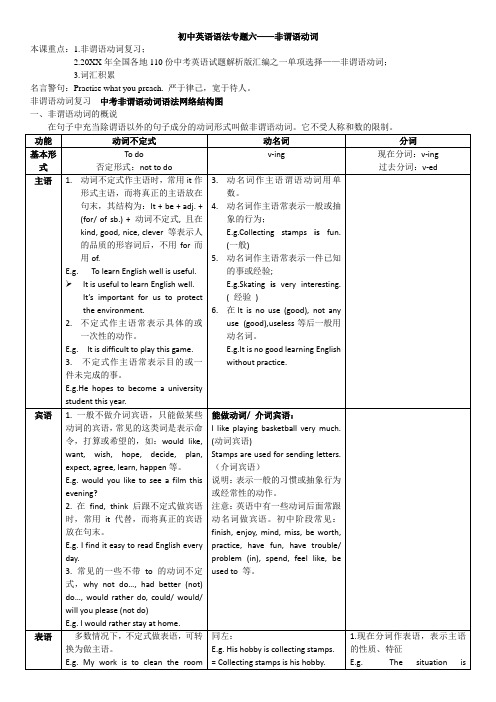
初中英语语法专题六——非谓语动词本课重点:1.非谓语动词复习;2.20XX年全国各地110份中考英语试题解析版汇编之一单项选择——非谓语动词;3.词汇积累名言警句:Practise what you preach. 严于律己,宽于待人。
非谓语动词复习中考非谓语动词语法网络结构图一、非谓语动词的概说1. like to do sth. 表示心理或一次性的具体动作like doing sth. 表示习惯性动作(类似的还有love, hate)2. begin / start to do sth begin / start doing sth.1)谈及一项长期活动或开始一种习惯时,使用doing.How old were you when you first started playing the piano?你几岁时开始弹钢琴?2)begin, start用进行时时,后面动词用不定式to doI was beginning to get angry。
我开始生起气来。
3)在begin, start 后接know, understand, realize这类动词时,常用不定式to do。
I begin to understand the truth。
4)物作主语时It began to melt.3. 感官动词+ doing/to do感官动词see, watch, , notice, look at, hear, listen to, smell, taste, feel + do表示动作的完整性,真实性;+doing 表示动作的连续性,进行性I saw him work in the garden yesterday.昨天我看见他在花园里干活了。
(强调"我看见了"这个事实)I saw him working in the garden yesterday. 昨天我见他正在花园里干活。
第六讲非谓语动词

第六讲非谓语动词一、总说:1.概念:不能在句中单独做谓语的动词形式,在句中起名词、形容词或副词作用。
2. 时态和语态:非谓语的时态和语态是相对的,要选择正确的非谓语形式,必须找准参照物,牢记一句口诀:___________________________________。
3. 分类: to do,v-ing和v-ed。
4. 否认形式:在非谓语标志性的单词前加not,即在to, v-ing或v-ed前面加not。
二、不定式:㈠不定式的时态:参照物是_____________,须比拟二者的_______关系。
①一般式to do:表示的动作和谓语动词动作_________或发生在谓语动词动作_______。
. He decided to go with us.I hope to see you next week.②进展式to be doing: 表示的动作和谓语动词动作__________。
. The boy pretended to be working hard.He seems to be reading in his room.③完成式to have done: 表示的动作发生在谓语动词动作_______。
. I’m sorry to have interrupted you.比拟该句和I’m sorry to interrupt you.的区别:㈡不定式的语态:参照物是___________,须比拟二者的________关系。
. a. The library __________ next year is very beautiful. (build)b. The room seems ___________________ already. (tidy up)注:①在easy, hard, difficult, pleasant, interesting等形容词后的不定式由于往往能补充出for sb.〔即动作的发出者〕, 所以通常使用主动形式:. a. The water is not fit to drink.b. The chair is comfortable to sit on.c. The problem is difficult to deal with.②某些动词的不定式作表语,需用主动形式表被动含义:e.g. a. Parents are to blame if their children do not have good manners.b. The house is to let.㈢不定式的句法功能:动词不定式除了不能单独作谓语外,几乎能充当句子中所有的句子成分。
6高中英语非谓语动词

6高中英语非谓语动词非谓语动词非谓语动词包括不定式(to do)、动名词(-ing)、现在分词(-ing)与过去分词(-ed)。
它们不受主语人称和数的限制,在句子中不能充当谓语,但可以充当句子的其他成分,并且有时态和动词不定式定义:动词不定式是非谓语动词的一种,它没有人称和数的变化,在句子中不能独立作谓语,但它仍保持动词的特点,可以有自己的宾语和状语。
一、不定式的意义1. 不定式的一般式:一般式表示的动作或状态发生在谓语动词表示的动作或状态的同时或之后。
当不定式的逻辑主语是这个不定式所表示的动作的承受者时,不定式一般要用被动式(to be done).eg: He seemed to be tired. The building to be finished next month is for our teachers.2. 不定式的进行式:进行式表示动作正在进行,与谓语的动作同时发生。
e.g. When I went to his home, he happened to be traveling around the world.3. 不定式的完成式:如果不定式所表示的动作或状态发生在谓语动词所表示动作或状态之前,就用完成式;若是在此基础上的被动含义,就用完成被动式( to have been done).e.g. He is said to have written a novel about theLong March.He is said to have been taught French when he was a child.4. 不定式的完成进行式:如果不定式的动作是在谓语所表示的时间之前一直在进行或有可能继续进行的动作,就要用完成进行式.eg: We’re happy to have been working with the experts all the month.二、不定式的用法:1. 不定式做主语:不定式做主语一般表示具体的某次动作。
非谓语动词(六)

英语:动词的非谓语形式【重点难点提示】一、重点是:1 .动词不定式(1)动词不定式的构成为:“to + 动词原形〞(有时可不带to)。
动词不定式没有人称和数和的变化。
(2)动词不定式既有名词的特性,又有动词的特性,它可以有自己的宾语和状语。
它在句中可充当主语、宾语、表语、定语、状语和补足语。
2 .动词ing形式的用法。
3 .动词过去分词的用法。
二、难点是:(1)在有些动词后动词不定式作宾语补足语时不带to。
(2)有些动词后只能接动词不定式作宾语。
(3)有些动词后只能接动词ing形式(即动名词)作宾语。
(4)有些动词后既可接动词不定式作宾语,也可接动词ing形式作宾语,但意思不同。
【同步达纲练习】Ⅰ .用括号中所给动词的适当形式填空。
1 .Bill lives in a place called (call) Gum Tree .2 .Let him have (have) a good rest .3 .Li Ping made the baby laugh (laugh) at last .4 .Miss Gao wants to take (take) these books to the classroom now .5 .She is ill .So she had better stay (stay) in bed for a few days .6 .You’d better not look (not ,look) out of the window in class .7 .It was very nice to play (play) with you .8 .They wake up their parents , called (call) :“Merry Christmas !〞9 .A lot of good land has gone with them ,(leave) only sand .10 .There was a fire (burn) in the fireplace .11 .The policeman told the boys (not ,play) football near the road .12 .Why not (go) to the park with us tomorrow ?13 .We’re free now .How about (fly) kites ?14 .We often hear our English teacher (sing) English songs .15 .One day ,his father saw him (sit) on some eggs .16 .Mr Wu have watched us (play) basketball for half an hour .17 .This morning I kept on (think) about the Christmas party this evening .18 .A lot of English people are good at (boat) .19 .We’re very thirsty .Let’s stop (drink) some water .20 .When the two boys saw the teacher ,they stopped (fight) at once .21 .Kate is a little ill .She doesn’t feel like (eat) anything these days .22 .In the old days ,the workers were made (work) more than 16 hours a day .23 .Have you finished (do) your homework yet ?24 .The heavy snow stopped many people from (go) to work .25 .Mary found a watch (lie) on the road on her way to school .26 .Do you like (fish) ?Yes .But I don’t like (fish) now .27 .Thank you for (lend) it to me .28 .Jim and his parents enjoy (live) in China very much .29 .—Do you mind my (smoke) here ?—Yes ,but I do .30 .—Would you like (e) to my birthday party this evening ?—Certainly .I’ll be glad to .31 .Don’t spend too much time (watch) TV .32 .The farmers are busy (get) ready for the next year .33 .We’re going to do some (shop) this Sunday .34 .—Shall we go (skate) tomorrow ?—That’s a good idea .35 .In England ,the first name is the (give) name .36 .Do you know another way of (say) the word ?37 .(take) a walk after supper is good for our health .38 .He quickly got up and went on (run) .39 .Sorry ,I have a lot of work (do) today .40 .It’s very kind of you (help) us .41 .It’s much better (give) than (receive) .42 .I don’t know what (do) next .43 .She’ll read a book tonight instead of (see) a film .44 .England is a (develop) country and India is a (develop) one .45 .That pot was used for (keep) tea hot after it was made .46 .I remember (tell) you the story before .47 .Take the second (turn) on the right .48 .The boy can’t get (dress) himself .49 .Don’t forget (lock) the door when you leave .50 .She’ll try her best (catch) up with the class .参考答案【同步达纲练习】Ⅰ .1 .called 2 .have 3 .laugh 4 .to take 5 .stay 6 .not look 7 .to play8 .calling 9 .leaving 10 .burning 11 .not to play 12 .go 13 .flying 14 .sing15 .sitting 16 .play 17 .thinking 18 .boating 19 .to drink 20 .fighting 21 .eating 22 .to work 23 .doing 24 .going 25 .lying 26 .fishing ,to fish 27 .lending28 .living 29 .smoking 30 .to e 31 .watching 32 .getting 33 .skating 34 . skating 35 .given 36 .saying 37 .Taking 38 .running 39 .to do 40 .to help 41 .to give ,to receive 42 .to do 43 .seeing 44 .developed ,developing 45 .keeping 46 .telling 47 .turning 48 .dressed 49 .to lock 50 .to catch非谓语动词专项练习题一、用所给动词适当形式填空:A . ① I want one magazine ______ . ( read )② My teacher wanted me ______ this question . ( answer )③ The woman wanted her husband ______ at once . ( examine )④ My bicycle wants _______ . ( repair )B . ① What made you ______ so ? ( think )② The girl was made _____ a man she didn`t love at all . ( marry )③ The show made me _______ in the study of science . ( interest )④ He raised the picture to make everyone _______ clearly . ( see )⑤ He raised his voice to make himself _______ . ( hear )⑥ My father himself made some candles _______ light . ( give )⑦ The boss made the workers _______ day and night . ( work )C . ① You`d better get your own room _______ . ( clean )② Yesterday he got his wallet _______ . ( steal )③ You should get your friends _______ you . ( help )④ The lecture got us _______ . ( think )⑤ Don`t get ________ in the rain . ( catch )D . ① Did you see somebody _______ into the room ? ( steal )② I saw him _______ in the room at that time . ( read )③ She was glad to see her child ________ good care of . ( take )④ I saw her _______ at the windows , thinking . ( seat )⑤ She was seen ________ here . ( e )E . ① I like _______ very much . ( swim )② I don`t like _______ TV at this time . ( watch )③ He never likes _______ at the meeting . ( praise )④ I feel like _______ to the cinema . ( go )⑤ Would you like ______ with me ? ( go )F . ① The man ______ at the meeting now is from the south . ( speak )② I don`t know the professor ______ at the meeting tomorrow . ( speak )③ He is the professor _______ to dinner . ( invite )G . ① It was so cold and he had the fire _______ all night long . ( burn )② I have a lot of exercises ________ today . ( do )③ "Do you have nay clothes _______ today ? "asked Mother . ( wash )④ You`d better have that bad tooth _______ out . ( pull )⑤ I want to have him _______ a car for me . ( find )H . ① He doesn`t do anything but _______ all day . ( play )② We have no choice but _______ . ( obey )③ I`m thinking of how _______ my English . ( improve )④ He made an apology for _____ late . ( be )I . ① He told us about his trip in an _______ voice . ( excite )② He told us his story in a _______ voice . ( tremble )③ At the sight of a snake , the little girl was very _______ . ( frighten )④ The boy was _______ , so I didn`t believe him again . ( disappoint )J . ① He is looking forward to ______ college . ( enter )② He is looking forward to _____ nothing . ( see )K . ① When he heard the news , he couldn`t help ________ with joy . (jump)② I couldn`t help ______ by the beauty of nature . ( strike )③ Sorry , I can`t help ______ the housework today . ( do )L . ①______ enough time , we`ll do it better . ( give )②______ a candle , he went on reading . ( light )③______ from the hill , the park looks more beautiful . ( see )④______ the people well , we must work hard at our lessons . ( serve )二、单项选择:〔1〕1. Saying always has less difficulty than _____.A. doneB. doingC. to doD. having done2. The girl is seriously ill. There is _____.A. nothing to do but send for a doctorB. something to do but to send for a doctorC. nothing to do but to send for a doctorD. anything to do but sending for a doctor3. The rest of the money _____ to Alice.A. is to sendB. are to sendC. is to be sentD. are to be sent4. Although swimming is his favorite sport, yet he doesn’t like _____ t oday.A. to swimB. swimmingC. swimD. to have swim5. She said she was sorry _____ the train, so she had to stay here for another day.A. missingB. having missedC. to missD. to have missed6. _____ the same mistake again made his parents very angry.A. His being madeB. He has madeC. He had makingD. His making7. I find the man hard _____.A. to be pleasedB. pleasingC. pleasedD. to please8. You’d better not have t he lights _____ all day long.A. burningB. burnedC. to burnD. being burnt9. It is _____ thinking about it now.A. of no useB. not useC. no useD. not of any uses10. —Would you like to sing a song for us?—_____.A. I prefer notB. I prefer not toC. I prefer to notD. I wouldn’t prefer11. He insisted _____ the working site.A. to be sent toB. being sent toC. on being sent toD. that to be sent to12. During the next ten years, she had to work hard _____ for the necklace.A. payingB. to payC. for payingD. in order to paying13. Janet was angry at _____.A. my not waiting for herB. I didn’t wait for herC. me not wait for herD. me to not wait for her14. I prefer staying at home _____ the theater.A. to go toB. for going toC. to going toD. rather than go15. Please get someone _____ the washing machine. I want to get it _____ as soon as possible.A. to repair/to be repairedB. repair/repairedC. to repair/repairingD. to repair/repaired16. _____ more time, he could have done the work much better.A. To be givenB. To giveC. GivenD. Giving17. The information _____ to us is of great value.A. broughtB. takenC. being takenD. being carried18. The building _____ next month will be a modern hospital.A. builtB. being builtC. to be builtD. be built19. Jessie was sick _____ such noise.A. of hearingB. to hearC. of being heardD. heard20. _____, he left the room.A. Finishing the workB. Had finished the workC. After finished the workD. Having finished the work21. _____ afraid _____ behind, Bill studied even harder than ever before.A. To be/of fallingB. Being/fallC. Being/of fallingD. To be/to fall22. The machine requires _____, so the workers are required _____ ready.A. repair/to getB. repairing/to getC. repairing/gettingD. to be repaired/getting23. Everyone dislikes _____.A. being laughedB. to be laughedC. being laughed atD. to be laughed at24. Would you like Helen _____ you since you have some difficulty?A. helpingB. to helpC. has helpedD. help25. He is beginning _____ his mistakes.A. correctB. to correctC. correctingD. corrected26. The Americans can’t use chopsticks _____.A. to eatB. to eatingC. eatingD. to eat with27. My wish is _____ the people well in the future.A. to serve forB. to serveC. servingD. serving for28. The poor boy, _____ with extraordinary strength, _____ from the ground.A. filled/roseB. filling/roseC. full/raisedD. filled/risen29. Most shops are open every day, Sunday _____.A. includingB. includedC. being includedD. to include30. _____ hot, he left only his stomach _____ with a piece of cloth.A. Feeling/coveringB. Feeling/coveredC. Felt/coveredD. Felt/covering31. He advised _____ a meeting _____ the problem.A. holding/to discussB. holding/for discussingC. to hold/to discussD. hold/discussing32. _____ the teacher, and he will tell you the answer.A. AskingB. AskC. If askD. If you ask33. The thief entered the room without _____.A. noticingB. being noticedC. having noticedD. having been noticed34. I happened _____ the story when she told me about it.A. having heard ofB. to have heard ofC. to be heard ofD. to hear of35. He is said _____ abroad already.A. having sentB. to be sendingC. to have been sentD. being sent36. He was made _____ working because of his poor health.A. stoppingB. to stopC. stoppedD. stop37. Do you consider it any good _____ again?A. to tryB. tryC. tryingD. for you to try38. I regret _____ you that we are unable to offer you a job.A. informingB. having informedC. to informD. to informing39. I would appreciate _____ back this afternoon.A. you to callB. you callC. your callingD. you’re calling40. She admitted _____ the key.A. being takingB. to takeC. having takenD. to have taken41. Besides _____, she is kind and tender.A. beautifulB. being beautifulC. she beautifulD. is beautiful42. I don’t want to speak to you, but I _____.A. have to speakB. have toC. must speakD. must43. I wondered whether the movie was _____ worth _____.A. very/seeingB. well/being seenC. very/being seenD. well/seeing44. The lecturer began by _____ us where the island was, and went on _____ about its history.A. telling/talkingB. to tell/to talkC. telling/to talkD. he told/talking45. After seeing the movie, _____.A. the book was read by himB. the book made him want to read itC. he wanted to read the bookD. the reading of the book interested him46. —Why doesn’t he take notes?—He has no pen _____. He seems _____ it.A. to write/to forget bringingB. to write with/to forget to bringC. to use with/to have forgotten to bringD. to write with/to have forgotten to bring47. When _____, water can be changed into vapor.A. heatedB. being heatedC. having been heatedD. to heat48. Having finished the work, _____.A. it was almost six o’clockB. a postman came and delivered the evening paper and some lettersC. supper had already been preparedD. we had a rest and then had supper49. _____, she felt quite shy at the party.A. As she a strangerB. Being a strangerC. According to a strangerD. She was a stranger50. Flank went to the swimming pool _____ swimming.A. to goB. goneC. goingD. go51. The _____ girl sat in the corner, crying.A. frightenB. frightenedC. frighteningD. fright52. On a _____ morning the little match girl was found _____ at the corner ofthe street.A. freezing/freezingB. freezing/frozenC. frozen/frozenD. frozen/freezing53. They found a _____ old man _____ on the ground when the door was broken open.A. dying/lyingB. dying/liedC. dead/liedD. dead/lain54. Be quick, or you’ll get _____ in the rain.A. to be caughtB. catchingC. to catchD. caught55. Who could have imagined such a sweet-tempered girl as Jane _____ such a thing!A. doingB. to doC. will doD. does56. He told me not to leave the pot _____.A. uncoveredB. to uncoverC. to be uncoveredD. uncovering57. The experience made him _____ the study of science.A. interest inB. to interest inC. interesting inD. interested in58. He managed to make himself _____ with his _____ English.A. understood/breakingB. understood/brokenC. understand/breakingD. understand/broken59. Did you hear the sound like that of a door _____?A. burstB. to burst inC. burst inD. to be burst in60. I was deep in thought, so I didn’t notice _____.A. him to e inB. him e inC. he e inD. him ing in61. Have you any objection to _____ there on foot?A. be goingB. goingC. goD. went62. The wallet was returned to him without anything _____.A. missedB. to be missedC. missingD. to miss63. The teacher was far from _____ with the result of the exam.A. satisfyB. satisfiedC. being satisfiedD. satisfying64. Hurry up! Mother is sure _____ us at home.A. waitingB. to wait forC. to be waitingD. to be waiting for65. Mr Brown is said _____ a new novel.A. to writingB. to have been writtenC. to be writtenD. to have written66. When _____ into a warm room, the ice soon changed to water.A. to takeB. to be takenC. takingD. taken67. The old man walked in the street _____.A. followed his sonB. and following his sonC. and followed by his sonD. followed by his son68. _____ with fear, a hungry fox hid himself in a small cave, _____ his tail to the rain.A. Trembling/exposingB. Trembled/exposedC. Trembled/exposingD. Trembling/exposed69. The two farmers _____ what appeared to be small guns forced the enemy officer to hand in his map.A. carriedB. were carryingC. carryingD. had carried70. Six _____ nine makes fifteen.A. added toB. adds toC. added up toD. added by71. The lecturer _____ will be here tomorrow.A. to talk about so muchB. to be talking about so muchC. so much talking aboutD. so much talked about72. _____ some of the questions _____, the Premier said goodbye to us.A. Left/unansweredB. Leaving/unansweredC. Leaving/unanswerD. Left/unanswer73. _____ her mother had e, her face lit up.A. HearingB. Having heardC. When heardD. When she heard74. _____ in white, she looks much more beautiful.A. WearingB. DressingC. DressedD. Having dressed75. _____, the boy couldn’t enter his house.A. Since the key had lostB. The key being lostC. Lost the keyD. Having lost the key76. The Arctic is considered _____ the northern part of the Atlantic.A. having beenB. to have beenC. to beD. being77. It is impossible for the work _____ within a month.A. finishingB. being finishingC. to finishD. to be finished78. I am too glad _____ you.A. to seeB. seeingC. sawD. at seeing79. There is _____ what the weather will be like.A. not knowingB. no knowingC. not knowD. no known80. The bottle _____ the poison was sent to the laboratory for a test.A. containingB. containedC. which containingD. which is contained81. _____ the children, we are all sure everything will be all right.A. With him taken care ofB. With he taken care ofC. With him taking care ofD. With he taking care of82. At first she wanted to go to the cinema, but on second thoughts she decidedit would be better _____ at home and _____.A. stay/workB. to stay/to workC. stay/to workD. to stay/work83. He didn’t speak to me, let alone _____ me.A. helpB. to helpC. helpingD. helped84. The people’s government does its best to have the living standard of the people _____.A. risenB. raisedC. riseD. raise85. The little girl found her teddy bear _____ under the bed.A. hidingB. to hide86. Mr Smith is _____ to our English evening.A. more pleased than to eB. more pleased to e thanC. more than pleased to eD. more pleasing than to e87. Once _____, a bad habit is rather difficult to get rid of.A. formedB. to be formedC. formingD. having formed88. You can have no idea what is _____ to do when you e to see the strange boss.A. orderingB. being orderedC. to orderD. to be ordered89. The noise of the door _____ the baby.A. closing wakenB. to close wokeC. closed wakeD. being closed woke90. Please leave a window _____, for it’s too hot.A. openB. openingC. to openD. opened91. _____ not knowing the answer to such an easy question!A. HopeB. DecideC. ImagineD. Think92. He asked to be kept _____ about developments.A. informingB. informedC. to informD. inform93. _____ everywhere, the wolves had nowhere _____ themselves.A. Hunting/to hideB. To hunt/to hideC. Hunted/hidingD. Hunted/to hide94. It _____ this way.A. used to doB. used to be doneC. is used to doingD. is using to do95. They have a lot of difficulty _____.A. in overingB. to overe it96. Didn’t you forget us _____ together in the countryside?A. to workB. to workingC. workingD. worked97. You always hear about planes _____ because of technical faults.A. having been delayedB. being delayedC. having delayedD. delaying98. These are needed for _____ clothes, paper and other necessaries.A. the making ofB. making ofC. to makeD. makings99. Have the police caught _____ yet?A. the prisoner who escapesB. the escaping prisonerC. the escaped prisonerD. the prisoner have escaped100. Do you still remember _____ you when you stayed in hospital?A. my mother and me visitingB. my mother’s and my visitingC. my mother and me to visitD. my mother and me to have visited三、单项选择〔2〕1. There ______ no classes yesterday, we paid a visit to the Great Wall.A. wasB. beingC. wereD. had been2. The policeman rushed into the room only ______ an old lady lying on the ground.A. foundB. findC. findingD. to find3. The boy lay on the ground, his eyes ______ and his hands ______.A. closing; tremblingB. closed; tremblingC. closed; trembledD. closing; trembled4.______, the girls raced on to the second runners.A. Stick in handB. With a stick in her handC. Sticks in handD. Sticks in hands5. Each of them got up early ______ to catch the early bus.A. to hopeB. hopingC. so thatD. and6. How pleased the Emperor was ______ what the cheats said!A. hearingB. heardC. hearD. to hear7. We should prevent pollution ______ happily.A. from livingB. livingC. to livingD. to live8.I am busy now, so I can’t help ______ the machine.A. repairB. to have repairedC. repairingD. fixing9. Jane came very close ______ a gold medal for Britain in the Olympics.A. to winB. winningC. to winningD. to be won10. The boy seated himself in the corner with his back ______ to his father.A. turningB. to turnC. to be turnedD. turned11. ----By the way, when did you get your bedroom ______?----Last week.A. to paintB. paintedC. paintingD. to be painted12. He likes ______, but he doesn’t like ______ today because it is too cold.A. to swim; to swimB. swimming; swimmingC. to swim; swimmingD. swimming; to swim13. There is ______ what the weather will be like.A. not knowingB. no knowingC. not knowD. no known14. The novel is said ______ into many languages.A. to translateB. being translatedC. to have been translatedD. having been translated15. I’m examining the position he has just finished ______ the possible mistakes in it.A. correctingB. to correctC. correctedD. correct16. They would not allow him ______ across the enemy line.A. to risk goingB. risking to goC. for risk to goD. risk going17. He spent as much time as he could _____ the child.A. teachingB. to teachC. teachD. for teaching18. ----Alice, why didn’t you e yesterday?----I ______, but I had an unexpected visitor.A. hadB. wouldC. was going toD. did19. How pleased the Emperor was ______ what the cheats said!A. hearingB. to hearC. heardD. hear20. ______ the room, a letter was laid on the ground.A. EnteringB. Having enteredC. He enteredD. Mrs Green entering21. They set out ______ for the ______ boy.A. searching; losingB. searching; lostC. to search; lostD. to search; missed22. ______ her mother had e, her face lit up.A. HearingB. Having heardC. When hearingD. When she heard23. They arrived at their university very late, ______ the gate closely shut.A. foundB. to findC. findD. finding24. ----Do you have anything more ______, sir?----No. You can have a rest or do something else.A. typingB. to be typedC. typedD. to type25. The manager promised to keep me ______ of how our business was going on.A. to be informedB. on informingC. informedD. informing26. With a lot of difficult problems ______, the manager felt worried all the time.A. to settleB. settlingC. settledD. being settled27. Will those ______ the children from abroad e to the headmaster’s office?A. teachingB. teachC. who teachesD. who teaching28. After ______ for the job, you will be required to take a language test.A. being interviewedB. interviewedC. interviewingD. having interviewed29. They apologized for ______ to attend the meeting.A. their not being ableB. their being not ableC. them not ableD. them being able not30. They would not allow him ______ across the enemy line.A. to risk goingB. risking to goC. for risk to goD. risk going31. ______ to nuclear radiation, even for a short time, may produce variants(变异体) of genes in human bodies.A. Being exposedB. Having exposedC. ExposedD. After being exposed32. China became the 143rd member of the World Trade Organization on December 11, 2001, thus ______ its 15-year wish to join the global trade body.A. having realizedB. realizedC. realizingD. to realize33. Tom looked at Jenny, tears ______ his eyes, and shouted out the words ______ in his heart for years.A. filling; having hiddenB. filled; hiddenC. filling; hiddenD. filled; hiding34. They apologized for ______ to attend the meeting.A. their not being ableB. their being not ableC. them not ableD. them being able not35. Which will you enjoy ______ your vacation, traveling abroad or working in the countryside?A. to spendB. spendC. spendingD. spent36. ----Will you please tell us how you can seize the robbers?----I will spend a whole week ______ in your room to wait for their ing.A. lockingB. to lockC. lockedD. being locked37. I regret ______ you that they are unable to e to your wedding tomorrow.A. informingB. having informedC. to have been informedD. to inform38. He wondered if he could slip out of the lecture hall without anyone ______.A. noticingB. noticedC. to noticeD. being noticed39. After ______ for the job, you will be required to take a language test.A. being interviewedB. interviewedC. interviewingD. having interviewed40. He spoke in such a high voice ______ out in the street.A. as to be heardB. to be heardC. as to hearD. to hear41. As early as 1647 Ohio made a decision that free, tax-supported schools must be set up in every town ______ 50 households or more.A. havingB. to haveC. to have hadD. having had42. The building project ______ next year is, I think, not easy ______ in time.A. being carried out; to pleteB. carried out; to be pletedC. to be carried out; to pleteD. to be carried out; to be pleted43. The reason ______ she gave for not ing to the party is that her mother wouldn’t allow her to.A. thatB. whatC. whyD. because44. Excuse me, could you tell me how to get to the Grand Hotel? I thought it was on this corner, but I seem to ______ a mistake.A. makeB. be makingC. having madeD. have made45. ----Here’s a new pair of shoes for you.----Thank you, but there’s no need ______ a new pair for me.A. to have boughtB. to buyC. buyingD. to be buying46. What worried the boy most was ______ to visit his father in the hospital.A. his not allowingB. his not being allowedC. having not been allowedD. his being not allowed47. To do a bit for the motherland, ______.A. working hard is necessaryB. to learn a foreign language is neededC. it is important to master scienceD. one should serve the people whole-heartedly48. Everything ______ into consideration, they ought to have another chance.A. to takeB. takenC. to be takenD. taking49. The officials discussed the plan that they would like to see ______ the next month.A. carry outB. carrying outC. to carry outD. carried out50. With a lot of difficult problems ______, the manager felt worried all the time.A. to settleB. settlingC. settledD. being settled51. ----Do you have anything more ______, sir?----No, you can have a rest or do something else.。
高中英语非谓语的知识点总结
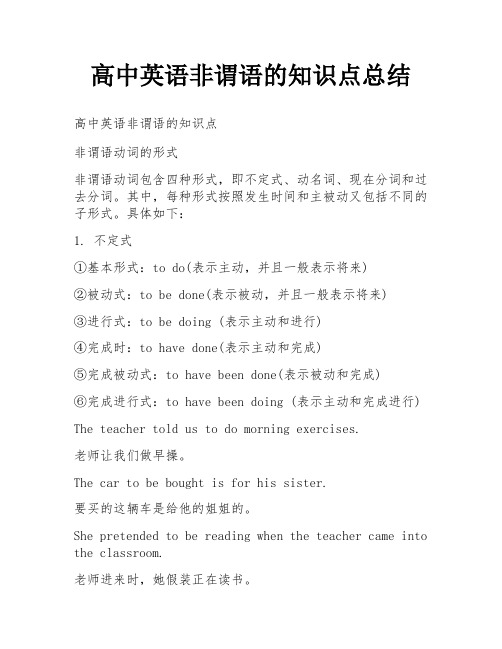
高中英语非谓语的知识点总结高中英语非谓语的知识点非谓语动词的形式非谓语动词包含四种形式,即不定式、动名词、现在分词和过去分词。
其中,每种形式按照发生时间和主被动又包括不同的子形式。
具体如下:1. 不定式①基本形式:to do(表示主动,并且一般表示将来)②被动式:to be done(表示被动,并且一般表示将来)③进行式:to be doing (表示主动和进行)④完成时:to have done(表示主动和完成)⑤完成被动式:to have been done(表示被动和完成)⑥完成进行式:to have been doing (表示主动和完成进行)The teacher told us to do morning exercises.老师让我们做早操。
The car to be bought is for his sister.要买的这辆车是给他的姐姐的。
She pretended to be reading when the teacher came into the classroom.老师进来时,她假装正在读书。
The thief is said to have escaped.据说小偷已经逃跑了。
The thief is said to have been arrested.据说小偷已经被抓住了。
She is said to have been working in the factory over the last 20 years.据说在过去的20年里,她一直在这家工厂工作。
2. 动名词①基本形式:doing (表示主动)②被动式:being done(表示被动)③完成式:having done(表示主动和完成)④完成被动式:having been done(表示被动和完成)Travelling in space by ordinary people will be mon in the future.在未来,普通人在太空旅行将会是普遍的事情。
(完整版)非谓语动词语法讲解
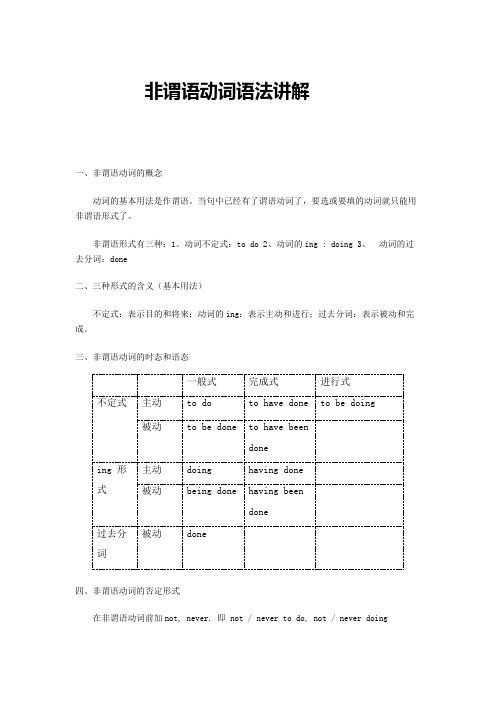
非谓语动词语法讲解一、非谓语动词的概念动词的基本用法是作谓语。
当句中已经有了谓语动词了,要选或要填的动词就只能用非谓语形式了。
非谓语形式有三种:1、动词不定式:to do 2、动词的ing : doing 3、动词的过去分词:done二、三种形式的含义(基本用法)不定式:表示目的和将来;动词的ing:表示主动和进行;过去分词:表示被动和完成。
三、非谓语动词的时态和语态一般式完成式进行式不定式主动to do to have done to be doing被动to be done to have beendoneing 形式主动doing having done 被动being done having beendone过去分词被动done四、非谓语动词的否定形式在非谓语动词前加not, never. 即 not / never to do, not / never doing五、非谓语动词的复合结构不定式的复合结构:for / of sb. to do sth.动词 ing 形式的复合结构:宾格或所有格+doing (-ing 形式作主语时,用的所有格+doing)六、非谓语动词的做题步骤1、判定是否用非谓语形式。
方法:看看句子中是否已有了谓语动词了2、找非谓语动词的逻辑主语。
方法:非谓语动词的逻辑主语一般是句子的主语。
3、判断主被动关系。
方法:非谓语动词与其逻辑主语的主动还是被动关系。
4、判断时间关系。
方法:分析句子,看看非谓语动词所表示的动作发生在谓语动作之前、之后还是同时。
之前常用 done; 之后常用to do; 同时常用doing.学习非谓语形式时,建议把三种形式一起来比较学习,会更加有效一些。
七、非谓语动词作主语和表语的比较1、不定式和动名词作主语和表语a. 不定式表示一次性的、具体的动词。
动词ing 常表示一般的、泛指的或习惯性的动作。
如:________ is a good form of exercise for both young and old.A. The walkB. WalkingC. To walkD. Walk(分析) a good form 暗示泛指一般的行为,用动名词作主语,选 Bb. 不定式作主语时,常用it 作形式主语,即用句型:It is + adj. / n. + (for / of sb. ) to do sth.It’s important for us to learn English well.It’s kind of you to help us.注意:下面几个句型是用动名词:It’s no good / use doing sth.It’s usel ess doing sth.There is no need to do sth.2、不定式、动名词、分词作表语的比较1、不定式、动名词作表语,.表示主语的内容。
非谓语动词的六大用法
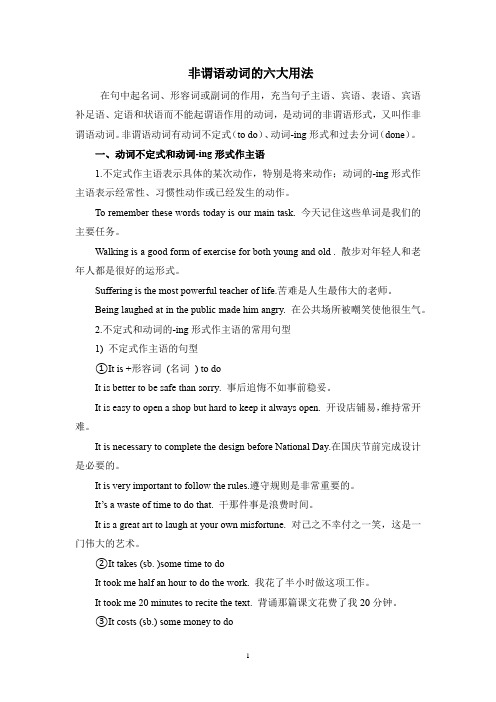
非谓语动词的六大用法在句中起名词、形容词或副词的作用,充当句子主语、宾语、表语、宾语补足语、定语和状语而不能起谓语作用的动词,是动词的非谓语形式,又叫作非谓语动词。
非谓语动词有动词不定式(to do)、动词-ing形式和过去分词(done)。
一、动词不定式和动词-ing形式作主语1.不定式作主语表示具体的某次动作,特别是将来动作;动词的-ing形式作主语表示经常性、习惯性动作或已经发生的动作。
To remember these words today is our main task. 今天记住这些单词是我们的主要任务。
Walking is a good form of exercise for both young and old . 散步对年轻人和老年人都是很好的运形式。
Suffering is the most powerful teacher of life.苦难是人生最伟大的老师。
Being laughed at in the public made him angry. 在公共场所被嘲笑使他很生气。
2.不定式和动词的-ing形式作主语的常用句型1) 不定式作主语的句型①It is +形容词(名词) to doIt is better to be safe than sorry. 事后追悔不如事前稳妥。
It is easy to open a shop but hard to keep it always open. 开设店铺易,维持常开难。
It is necessary to complete the design before National Day.在国庆节前完成设计是必要的。
It is very important to follow the rules.遵守规则是非常重要的。
It’s a waste of time to do that. 干那件事是浪费时间。
It is a great art to laugh at your own misfortune. 对己之不幸付之一笑,这是一门伟大的艺术。
高中英语语法填空(6)(非谓语动词)
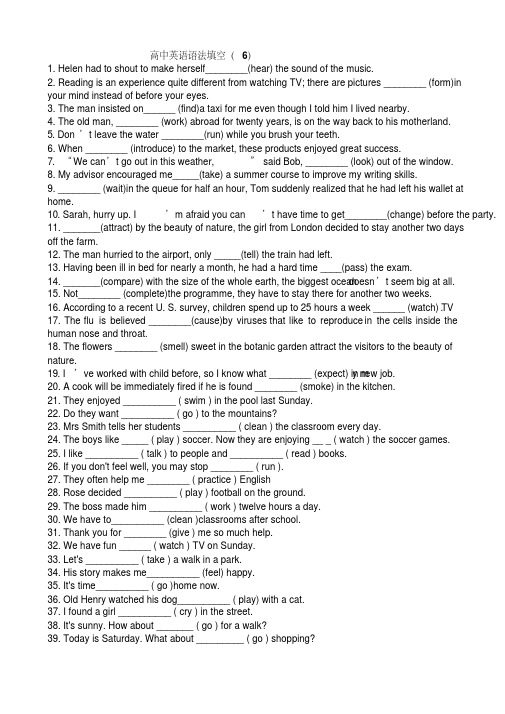
高中英语语法填空(6)1. Helen had to shout to make herself________(hear) the sound of the music.2. Reading is an experience quite different from watching TV; there are pictures ________ (form)inyour mind instead of before your eyes.3. The man insisted on______ (find)a taxi for me even though I told him I lived nearby.4. The old man, ________ (work) abroad for twenty years, is on the way back to his motherland.5. Don’t leave the water ________(run) while you brush your teeth.6. When ________ (introduce) to the market, these products enjoyed great success.7. “We can’t go out in this weather,” said Bob, ________ (look) out of the window.8. My advisor encouraged me_____(take) a summer course to improve my writing skills.9. ________ (wait)in the queue for half an hour, Tom suddenly realized that he had left his wallet at home.10. Sarah, hurry up. I’m afraid you can’t have time to get________(change) before the party.11. _______(attract) by the beauty of nature, the girl from London decided to stay another two daysoff the farm.12. The man hurried to the airport, only _____(tell) the train had left.13. Having been ill in bed for nearly a month, he had a hard time ____(pass) the exam.doesn’t seem big at all.14. _______(compare) with the size of the whole earth, the biggest ocean15. Not________ (complete)the programme, they have to stay there for another two weeks..16. According to a recent U. S. survey, children spend up to 25 hours a week ______ (watch) TV17. The flu is believed ________(cause) b y viruses that like to reproduce in the cells inside thehuman nose and throat.18. The flowers ________ (smell) sweet in the botanic garden attract the visitors to the beauty ofnature.y new job.19. I’ve worked with child before, so I know what ________ (expect) in m20. A cook will be immediately fired if he is found ________ (smoke) in the kitchen.21. They enjoyed __________ ( swim ) in the pool last Sunday.22. Do they want __________ ( go ) to the mountains?23. Mrs Smith tells her students __________ ( clean ) the classroom every day.24. The boys like _____ ( play ) soccer. Now they are enjoying __ _ ( watch ) the soccer games.25. I like __________ ( talk ) to people and __________ ( read ) books.26. If you don't feel well, you may stop ________ ( run ).27. They often help me ________ ( practice ) English28. Rose decided __________ ( play ) football on the ground.29. The boss made him __________ ( work ) twelve hours a day.30. We have to__________ (clean )classrooms after school.31. Thank you for ________ (give ) me so much help.32. We have fun ______ ( watch ) TV on Sunday.33. Let's __________ ( take ) a walk in a park.34. His story makes me__________ (feel) happy.35. It's time__________ ( go )home now.36. Old Henry watched his dog__________ ( play) with a cat.37. I found a girl __________ ( cry ) in the street.38. It's sunny. How about _______ ( go ) for a walk?39. Today is Saturday. What about _________ ( go ) shopping?。
专题6非谓语动词概要

专题6 非谓语动词►考点一不定式和动名词作主语规则1:动名词作主语通常表示抽象的或习惯性的动作,而不定式作主语则表示具体的、某一次的行为。
如:Smoking is forbidden in public places.(习惯性的)It is impossible to go swimming this afternoon.(具体的)规则2:不定式及动名词短语作主语时可转换成it作形式主语。
如:It was no use sending him to a hospital.It's very hard to learn an art.规则3: 动名词带逻辑主语时,只可在其前加上物主代词或名词的所有格。
如:Jack‘s sudden disappearing made them worried.(不可用Jack) 规则4:带逻辑主语的动名词结构作主语时,可以和主语从句之间相互转换。
如:His being elected our team leader made us all very excited.=That he was elected our team leader made us all very excited.他被选为我们的队长,使我们都很兴奋。
规则5:adj.+for sb. to do sth.与adj.+of sb. to do sth.。
若形容词仅仅是描述事物,不是对不定式行为者的品格进行评价,用for sb.,这类形容词有difficult,easy,hard,important,dangerous,(im)possible等;若形容词是描述人物性格、特性等的形容词brave, courageous, careful, careless, clever, wise, foolish, silly, stupid, good, nice, kind, thoughtful, considerate, greedy, generous, honest, modest, polite, rude, cruel,selfish, wicked, wrong等时,常用of引出不定式的逻辑主语。
高中英语真题-第六节 非谓语动词
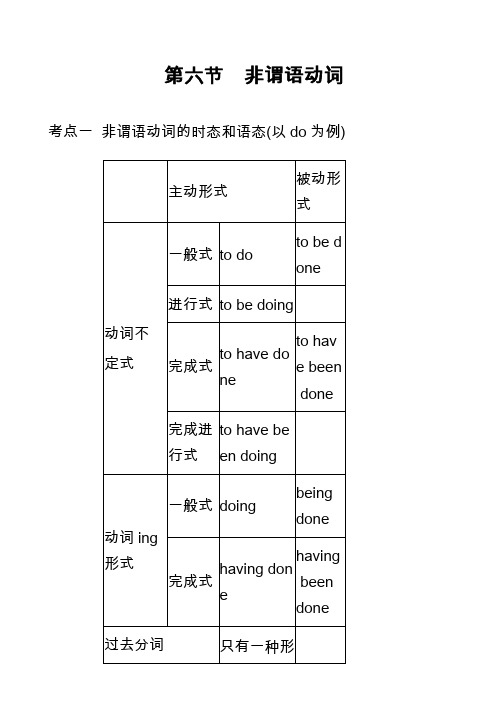
第六节非谓语动词考点一非谓语动词的时态和语态(以do为例)考点二非谓语动词作状语1.不定式作状语(1)作目的状语,有时用in order to或so as to。
To be a winner,you need to give all you have and try your best.要想成为赢家,你要付出所有并竭尽全力。
(2)作结果状语,常用结构enough to,too...to ...,only to等。
I'm too tired to stay up any longer.我太累了,不能再熬夜了。
(3)作原因状语,此时常与表示情感的形容词连用,如glad,happy,frightened,surprised等。
I'm very glad to meet you here.在这儿遇见你我真高兴。
[名师点津] 在“主语+系动词+形容词+to do”的结构中,常用主动形式表示被动含义。
The question is very difficult to answer.这个问题很难回答。
2.动词ing形式作状语(1)动词ing形式作状语时与谓语动词所表示的动作同时或几乎同时发生,having done表示先于谓语动词所表示的动作。
Not knowing his address,I can't call on him.由于不知道他的地址,我无法拜访他。
Not having received a reply,he decided to write again.由于没有收到回信,他打算再写一封。
(2)动词ing形式可作时间、原因、方式、伴随、结果、让步等状语。
The children came in,singing and jumping.孩子们又唱又跳地进来了。
3.过去分词作状语(1)过去分词作状语时与句中主语构成逻辑上的动宾关系,且先于谓语动作发生。
Inspired by his speech,we took action at once.在他演讲的鼓舞下,我们马上行动了起来。
初中英语语法公式(6)非谓语动词

初中英语语法公式(6)非谓语动词公式1To do+谓语动词+其他(不定式作主语):To learn Chinese well is very difficult. 学好汉语很难。
公式2主语+谓语动词+to do…(不定式作宾语):I can’t afford to buy a car. 我买不起汽车。
公式35主语+谓语+it+形容词+(for sb.)to do…(不定式作宾语)I think it hard to learn English well. 我认为学好英语很困难。
公式3主语+及物动词+宾语+ (to) do…(不定式作宾语补足语)He told us to work hard. 他告诉我们要努力学习。
公式4be+情感形容词+to do…(不定式作状语)She was happy to hear the news. 听到这个消息她很高兴。
公式5to do…/in order to do…/…so as to do…(不定式作状语)To find out more about courses, write to this adress. 想了解更多课程的信息,按这个地址来函。
公式6动名词+谓语动词+其他(动名词作主语)Watching TV too much is bad for eyes. 看太多的电视对眼睛不好。
公式7主语+及物动词(短语)+动名词(动名词作宾语)Would you mind my singing here? 我在这里唱歌,你介意吗?公式8... without + N/doing ...结构︰主语+动词+…without+名词/动名词…。
说明︰此句型意为“主语没有(不用)…”。
without 当“没有;不用;假如没有;当…不”解,是介系词,后面接名词(代名词)或动名词,用法相当于“and ... not”或“if(when)…not+动词”。
I can’t start a fire without matches. 我没有火柴不能点火。
考研英语语法 非谓语动词(6)

LECTURE 6 非谓语动词本堂目标熟悉非谓语动词的四种基本形式有其基本用法,重点掌握一些固定句型与结构中的动名词、同一动词(短语)后不定式和动名词比较、现在分词与动名词的区别。
基础预习非谓语动词是指那些在句中不能单独充当句子谓语成分的动词形式。
基本形式有四种:不定式(infinitive)、动名词(gerund)、分词(participle)和独立主格结构。
一、不定式动词不定式是非谓语动词中使用最广泛的一种,在句子中,它除了不能作谓语外,可以担当其他任何成分,可以作主语、宾语、表语、状语、定语和宾语补足语。
它在句子中起名词、形容词和副词的作用。
1.不定式的时态与语态动词不定式由不定式符号to+动词原形构成,但有时to也可以省略。
动词不定式不仅具有主动与被动的形式,而且还有一般、进行和完成三种时态形式。
一般时具有较鲜明的将来意义,所以常用来表示尚未发生的动作,这一点非常重要。
进行式和完成式则分别表示正在进行的动作和先于谓语动词发生的动作。
【例1】【例3】(93-语法)2.不定式的语法功能动词不定式具备名词、形容词和副词三种词性,所以能充当的句子成分也很多。
1)作主语不定式结构作主语时,为避免头重脚轻,一般用it作形式主语。
2)作宾语以不定式直接作宾语的动词多为“同意、决定、试图、安排、保证、拒绝、喜欢、害怕、假装、申请”等含义的词。
【例】用it作形式宾语,而将其真实宾语不定式后置的动词多属“认为、判定、感觉”等含义的词,如consider,feel,find,judge,make,think等。
3)作表语不定式结构作表语,跟在系动词后面,说明主语的状态。
【例】(04-Text 1)4)作定语在下列名词/代词后常接动词不定式作定语:【例】(02-翻译)5)作状语不定式结构可以单独作状语,表示目的,经常以in order to ,so as to ,such…as to 等形式出现。
不定式结构单独作状语,还可表示结果。
专题6非谓语动词-2022届新高考英语基础记忆及题型解题技巧(原题+答案解析)

非谓语动词非谓语动词{形式{肯定式{不定式{主动形式:to do,to be doing,to have done,to have been doing被动形式:to be done,to have been done现在分词、动名词{主动形式:doing,having done被动形式:being done,having been done过去分词:done否定式:以上肯定形式前加not,如not to do,not doing,not to be done等复合结构{动名词的复合结构:名词所有格/形容词性物主代词+动名词不定式的复合结构:for sb./sth.+不定式句法功能{不定式:作主语、宾语、补语、状语、表语、定语分词:作补语、定语、状语、表语动名词:作主语、宾语、定语、表语功能辨析{(★★★)作宾语{只用不定式作宾语的动词只用动名词作宾语的动词(词组)既可用不定式,也可用动名词作宾语,但意义上有区别的动词(词组)need,want,require,deserve后的不定式、动名词作宾语的用法(★★★)作定语{不定式作定语分词作定语动名词作定语to be done,being done,done作定语的区别(★)作主语、表语(★★★)作状语{不定式作状语分词作状语独立成分作状语独立主格结构(★)作补语{用不定式作宾语补足语/主语补足语的动词及动词词组不定式、分词作感官动词宾语补足语/主语补足语不定式、分词作使役动词宾语补足语/主语补足语动词leave,keep,find,catch及介词with后作宾补的不定式、分词的区别...be said/believed/supposed/reported/considered/found/thought后需用不定式作主语补足语非谓语动词概述1.什么是非谓语动词?非谓语动词是动词的特殊形式,在句子中可以充当谓语以外的成分。
2.非谓语动词在句子中的作用一个句子中已存在一个主句(含谓语动词),又没有连词的情况下,再出现一个动词则用非谓语动词。
- 1、下载文档前请自行甄别文档内容的完整性,平台不提供额外的编辑、内容补充、找答案等附加服务。
- 2、"仅部分预览"的文档,不可在线预览部分如存在完整性等问题,可反馈申请退款(可完整预览的文档不适用该条件!)。
- 3、如文档侵犯您的权益,请联系客服反馈,我们会尽快为您处理(人工客服工作时间:9:00-18:30)。
精品题库:第四章语法练习分类汇编第六章非谓语动词第一部分近年高考题荟萃2009年高考题1. (09安徽28) The play next month aims mainly to reflect the local culture.A. producedB. being producedC. to be producedD. having been produced答案 C2 (09北京24) For breakfast he only drinks juice from fresh fruit _____ on his own farm.A. grownB. being grownC. to be grownD. to grow K 答案 A3. (09北京27) The way the guests _____ in the hotel influenced their evaluation of the serviceA. treatedB. were treatedC. would treatD. would be treated答案D4. (09北京28)All of them try to use the power of the workstation ___ information in a more effective way.A. presentingB. presentedC. being presentedD. to present 答案D5. (09北京34) ___ twice, the postman refused to deliver our letters unless we chained our dog.A. Being bittenB. BittenC. Having bittenD. To be bitten 答案 A6. (09福建32)not to miss the flight at 15:20, the manager set out for the airport in a hurry.A. RemindingB. RemindedC. To remindD. Having reminded 答案B解析考查非谓语动词。
非谓语动词做状语,逻辑主语是句子的主语the manager,非谓语动词与句子主语是被动关系,且其表示的动作在谓语动词set out之前已经发生,非谓语动词用过去分词,选B。
7. (09福建34) In April, 2009, President Hu inspected the warships in Qingdao, the 60th anniversary of the founding of the PLA Navy.A. markingB. markedC. having markedD. being marked 答案A 解析考查非谓语动词。
非谓语动词做状语,其后有宾语,故与逻辑主语是主动关系,且表示的动作与谓语动词的动作同时进行,用现在分词,选A。
8.(09湖南23) When he the door, he found his keys were nowhere.A. would openB. openedC. had openedD. was to open答案D解析考查非谓语动词。
动词不定时的用法。
句意为:当他要打开门的时候,他发现他的钥匙不见了。
动词不定时表示将要发生的动作。
9.(09湖南25)At the age of 29, Dave was a worker, in a small apartment near Boston and ____ what to do about his future.A. living; wonderingB. lived; wonderingC. lived; wonderedD. living; wondered解析考查分词的用法。
句意为:29岁的大卫,是一个工人,住在一间小公寓在波士顿附近,不知怎么办关于他的未来。
现在分词作定语修饰a worker,and 为并列连词,连接相同的成份。
答案 A10. (09湖南29) Nowadays people sometimes separate their waste to make it easier for it .A. reusingB. reusedC. reusesD. to be reused 答案D解析考查动词不定时的用法。
句意为:现在人们有时把他们的废物分开,以便很容易被重复利用。
重新再利用是指将来发生的动作,而且是被动的。
故选D。
11. (09湖南31)Please do me a favor —____ my friend Mr. Smith to Youth Theater at 7:30tonight.A. to inviteB. invitingC. inviteD. invited 答案C12. (09江西22) ______the right kind of training , these teenage soccer players may one day grewthe international stars.A. GivingB. Having givenC. To giveD. Given 答案D解析考查非谓语动词。
如果把句子补充完整就不难看出:If they are given the right kind of training , 可知主语they 即these teenager soccer players与give 之间是被动的关系,所以用过去分词。
根据主、从句主语一致可省略从句主语的原则,连词if 也可省,所以得出given the right kind of training , these teenager soccer players……13. (09江西34) The government plans to bring in new laws _____ parents to take moreresponsibility for the education of their children.A. forcedB. forcingC. to be forcedD. having forced 答案B 解析考查非谓语动词的用法。
现在分词短语作后置定语,修饰new laws ,相当于which forces ……...14 (09海南30)The children all turned the famous actress as she entered the classroom.A. looked atB. to look atC. to looking atD. look at 答案B解析句意为:当那位著名的女演员走进了教室,所有的孩子都转过头去看她。
turn to 表示―转向,求助‖的意思。
15. (09海南35) Now that we’ve discussed out problem, are people happy with thedecisions ?A. takingB. takeC. takenD. to take 答案 C 解析考查with +宾语+宾语补足语的用法。
句意为:现在,我们已经讨论了问题,是人们最满意的决定?take 与the decisions之间存在的关系是动宾关系,故用过去分词表示被动16. (09山东22) We are invited to a party ________in our club next Friday.A. to be heldB. heldC. being heldD. holding 答案 A 解析考查非谓语动词的用法,由next month可知时间是在将来,party是被举行,故选A。
17. (09陕西12) I still remember to the Famen Temple and what I saw there.A. to takeB. to be takenC. takingD. being taken 答案D 解析考查非谓语动词。
此处非谓语动词做remember的宾语,而remember后用非谓语动词做宾语时,可以用v-ing形式,v-ing表示的动作已经完成,也可用动词不定式,表示的动作还未发生,根据后文的saw可知此处非谓语动词动作已经完成,且与逻辑主语是被动关系,用v-ing的被动式,选D。
18. (09上海31)A small plane crashed into a hillside five miles east of the city, _____all four people on board. A. killed B. killing C. kills D. to kill答案B19. (09上海33)With the government’s aid, those _____ by the earthquake have moved to the new settlements.A. affectB. affectingC. affectedD. were affected答案C20. (09上海35)Bill suggested _____ a meeting on what to do for the Shanghai Expo during the vacation.A. having heldB. to holdC. holdingD. hold答案C21. (09上海39) David threatened his neighbour to the police if the damages were not paid.A. to be reportedB. reportingC. to reportD. having reported答案C22. (09四川4)Ladies and gentlemen, please remain _____ until the plane has come to a complete stop.A. seatedB. seatingC. to seatD. seat 答案A解析考查非谓语的用法。
remain后可接adj, v-ing, v-ed和to be done 等多种形式做表语,在该题中可以把seated视为一个形容词,所以正确答案为A。
23. (09四川2) He told us whether ______a picnic was still under discussionA. to haveB. havingC. haveD. had 答案B.解析考查非谓语的用法,分析句子可知whether +to do sth. 做了宾语从句的主语, He told us 后省略了宾语从句的引导词that。
